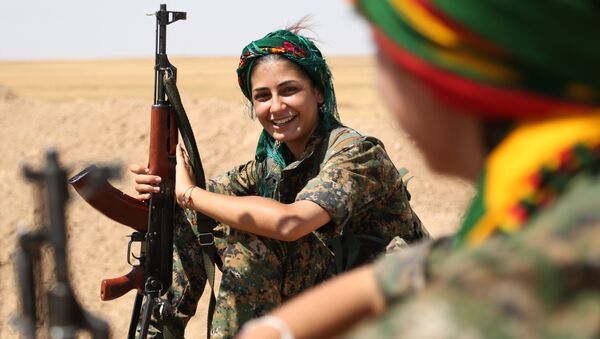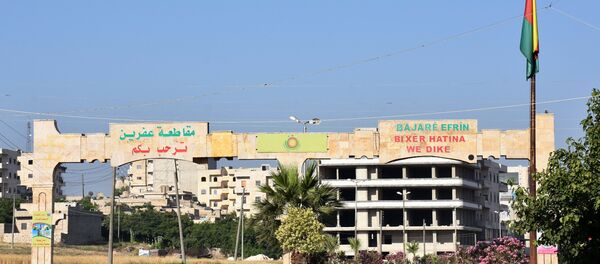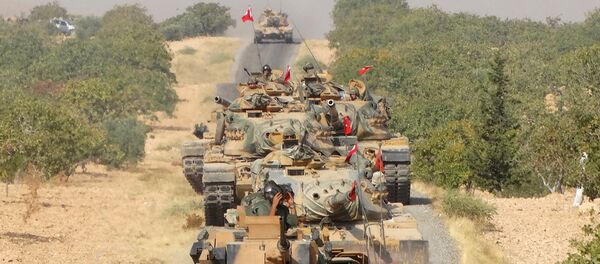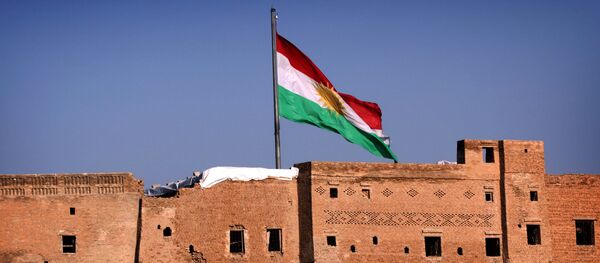According to Mirzayan, the most problematic issue will be related to self-rule among the Kurdish population, especially in Syria.
Kurdish Autonomy in Syria
At the moment, Kurds control two large areas in northern Syria. The first is the area spanning from Manbij in western Syria to the Turkish border in the north and Raqqa in the south. The second is Afrin Canton in northern Syria, one of the four cantons of Rojava, a de-facto autonomous Kurdish region established in Syria. The area between Afrin and the rest of the Syrian Kurdistan is currently controlled by Turkish military.
Syria is against the idea of replacing the current centralized government with a federation, in which the different regions of the country would enjoy a degree of autonomy. However, according to Mirzayan, this move is inevitable and Damascus will eventually have to agree.
Turkey, which nominally supports the idea of a federation, regards the Kurdish forces as terrorists and doesn’t want them to establish their own sovereign entity as part of a federation in Syria. Ankara believes Kurdish autonomy in Syria would inspire the Kurdistan Workers’ Party (PKK), a decades-old pro-independence faction in Turkey.
"Kurdish autonomy in Syria, not to speak of Syrian Kurdistan, will strengthen the PKK and revitalize the idea of a third Kurdistan in Turkey, after Iraq and Syria. This is why Erdogan said that Ankara will do everything to prevent a Kurdish state in northern Syria," Mirzayan wrote.
US-Kurdish Alliance
"This is why the US doesn’t want Turkey to conduct military operations against Syrian Kurds, because this would prevent them from taking Raqqa. The liberation of Raqqa would symbolize Trump’s victory over Daesh," Mirzayan wrote.
At the same time, Washington promised that the US would take into consideration Ankara’s interests. In particular, the US guaranteed that after the liberation of Raqqa, Kurds would leave the city and return heavy weapons received from the Pentagon.
"Apparently, Washington is not going to make good on this promise. After Raqqa is liberated the importance of Kurdish units is likely to further increase. Kurds are expected to project Washington’s influence in Syria as well as on Iran and Turkey. The Pentagon indicates that it will continue to support Kurds after the liberation of Raqqa," the author pointed out.
"Turkey is a NATO member and despite the growing independence of its actions, Ankara is still an ally of Washington. Turkey will watch the situation and try to negotiate benefits. But if the negotiations fail to produce the desired results Turkey may start acting more decisively," Vladimir Avatkov, director of the Center for Oriental Studies, told Sputnik.
One of the possible scenarios could be a Turkish offensive on Afrin.
Russia’s Interests
If Turkey decides to attack Kurds in Afrin, Ankara will have to talk to Moscow.
"Turkey and the coalition of Russia, Syria and Iran have similar interests when it comes to the Kurdish issues. None of them want Kurdish autonomy in Syria," Mirzayan wrote.
First, Kurds will need Moscow, as another ally in addition to the US, which will result in the bolstering of Russia’s influence in the region.
Second, this will have a "sobering effect" on Turkish President Recep Tayyip Erdogan who will not want to quarrel with Moscow amid tensions with the US over the Kurdish problem.
Finally, support for Kurds will weaken Washington’s positions in the region. The Kurdish problem is one of the most important for the region and Washington’s involvement is likely to turn other regional players against the US.








